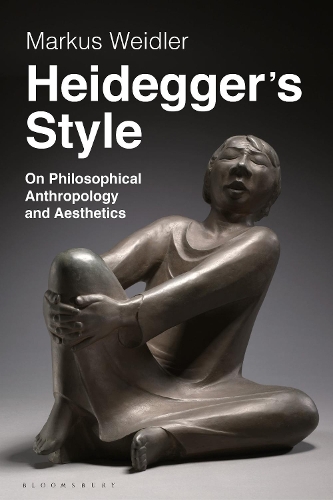
Heidegger's Style: On Philosophical Anthropology and Aesthetics
(Hardback)
Available Formats
Publishing Details
Heidegger's Style: On Philosophical Anthropology and Aesthetics
By (Author) Markus Weidler
Bloomsbury Publishing PLC
Bloomsbury Academic
24th January 2019
United Kingdom
Classifications
Tertiary Education
Non Fiction
Philosophy: metaphysics and ontology
Sociology and anthropology
193
Physical Properties
Hardback
288
Width 156mm, Height 234mm
576g
Description
Addressing Heideggers continuing centrality to continental thought, Markus Weidler argues that Heideggers prickly charm is best explained in terms of his great ingenuity, crafting a novel genre of writing which promises to harness the revelatory power of artworks for the purpose of philosophical inquiry. In doing so, Heidegger challenges the reader with a provocative form of artisan thinking, which for Weidler is central to understanding the significance of Heideggers work overall. In Vortrge und Aufstze (Public Lectures and Essays) Heidegger declares: 'once it has become anthropology, philosophy perishes from metaphysics.' Remarks critical of 'philosophical anthropology' are scattered throughout his writings, but so far commentators have not connected these tantalizing statements in any systematic way. This book deals with his hostility by addressing what we are to make of Heideggers frequent but elusive dismissals of philosophical anthropology as a field of study. This examination of Heideggers complex relation to philosophical anthropology traces how pioneering thinkers like Schelling and Schiller paved the way not only for Heidegger but also for some of his potential competitors, most notably Max Scheler and Georg Simmel. Weidler argues that confronting the puzzle over Heideggers peculiar relation to philosophical anthropology is also one of the keys to explaining his popularity as a philosopher, which has endured despite revelations of his various personal and political failings.
Reviews
Rarely are books this nuanced also this comprehensive. Anyone interested in Heidegger should read this book. Everyone attempting to think about aesthetics or religion after Heidegger must read it. -- J. Aaron Simmons, Associate Professor of Philosophy, Furman University, USA
Weidlers deeply scholarly book situates Heidegger in the history of modern German thought. Weidler corrects the prevalent tendency to read Heidegger out of context and offers us historically grounded arguments for re-assessing Heideggers problematic relation to the political. This book, which every Heidegger scholar will benefit from, proves the importance of philosophical anthropology and theology for Heideggers development; it shows that Heideggers conception of the holy is constructed as an alternative to the German Idealist effort to personalize the absolute. A refreshing and important contribution to Heidegger studies and the history of contemporary philosophy. -- Sean J. McGrath, Professor of Philosophy, Memorial University, Canada
Author Bio
Markus Weidler is Assistant Professor of Philosophy at Columbus State University, USA.
